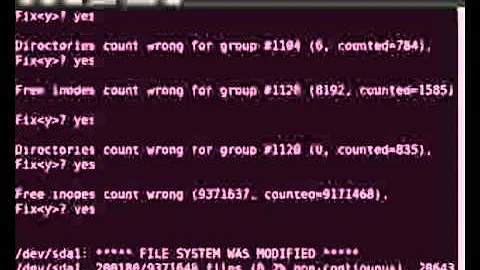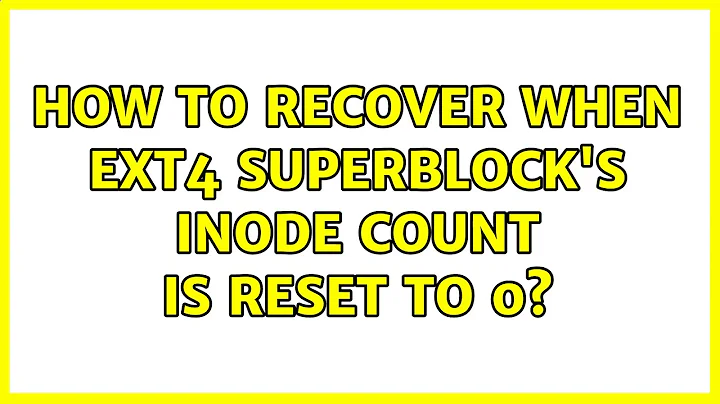Recovering ext4 superblocks
Solution 1
Unfortunately, I was unable to recover the file system and had to resort to lower-level data recovery techniques (nicely summarised in Ubuntu's Data Recovery wiki entry), of which Sleuth Kit proved most useful.
Marking as answered for cleanliness' sake.
Solution 2
This may be outdated already, but a few suggestions:
If you are absolutely sure that the original blocksize is 4096, as claimed by testdisk,
you can rewrite the superblocks on the disk using mke2fs -S. From man:
-S Write superblock and group descriptors only. This is useful if all
of the superblock and backup superblocks are corrupted, and a last-
ditch recovery method is desired. It causes mke2fs to reinitialize
the superblock and group descriptors, while not touching the inode
table and the block and inode bitmaps. The e2fsck program should be
run immediately after this option is used, and there is no guarantee
that any data will be salvageable. It is critical to specify the
correct filesystem blocksize when using this option, or there is no
chance of recovery.
If you are unsure about the correct blocksize, use mke2fs -n -b 2048 /dev/sdb1 and try all the superblock backups this command gives, and after that the same but using the last blocksize 1024.
Solution 3
As mentioned, probably outdated, but fdisk (AFAIK) doesn't support GPT disks. You need to use parted or some other tool.
I just tested a Virtual Machine running Debian squeeze (kernel 2.6.32-5-486) and formatted a virtual disk as GPT using parted ...
# parted /dev/sde
(parted) mklabel GPT
(parted) mkpart part1 0 10G
(parted) quit
# fdisk -l /dev/sde
.
WARNING: GPT (GUID Partition Table) detected on '/dev/sdb'! The util fdisk doesn't support GPT. Use GNU Parted.
.
Disk /dev/sde: 85.9 GB, 85899345920 bytes
255 heads, 63 sectors/track, 10443 cylinders
Units = cylinders of 16065 * 512 = 8225280 bytes
Sector size (logical/physical): 512 bytes / 512 bytes
I/O size (minimum/optimal): 512 bytes / 512 bytes
Disk identifier: 0x00000000
.
Device Boot Start End Blocks Id System
/dev/sde1 1 10444 83886079+ ee GPT
This is fdisk version 2.17.2 (util-linux-ng).
mkfs and fsck should pick up the 'real' partition OK, but in order to check that the GPT partition table is not corrupted, you should have used GNU parted.
Related videos on Youtube
tlvince
Updated on September 18, 2022Comments
-
tlvince over 1 year
Recently, my external hard drive enclosure failed (the hard drive itself powers up in another enclosure). However, as a result, it appears its EXT4 file system is corrupt.
The drive has a single partition and uses a GPT partition table (with the label
ears).fdisk -l /dev/sdbshows:Device Boot Start End Blocks Id System /dev/sdb1 1 1953525167 976762583+ ee GPTtestdiskshows the partition is intact:1 P MS Data 2049 1953524952 1953522904 [ears]... but the partition fails to mount:
$ sudo mount /dev/sdb1 a mount: you must specify the filesystem type $ sudo mount -t ext4 /dev/sdb1 a mount: wrong fs type, bad option, bad superblock on /dev/sdb1,fsckreports an invalid superblock:$ sudo fsck.ext4 /dev/sdb1 e2fsck 1.42 (29-Nov-2011) fsck.ext4: Superblock invalid, trying backup blocks... fsck.ext4: Bad magic number in super-block while trying to open /dev/sdb1and
e2fsckreports a similar error:$ sudo e2fsck /dev/sdb1 Password: e2fsck 1.42 (29-Nov-2011) e2fsck: Superblock invalid, trying backup blocks... e2fsck: Bad magic number in super-block while trying to open /dev/sdb1dumpe2fsalso:$ sudo dumpe2fs /dev/sdb1 dumpe2fs 1.42 (29-Nov-2011) dumpe2fs: Bad magic number in super-block while trying to open /dev/sdb1
mke2fs -n(note,-n) returns the superblocks:$ sudo mke2fs -n /dev/sdb1 mke2fs 1.42 (29-Nov-2011) Filesystem label= OS type: Linux Block size=4096 (log=2) Fragment size=4096 (log=2) Stride=0 blocks, Stripe width=0 blocks 61054976 inodes, 244190363 blocks 12209518 blocks (5.00%) reserved for the super user First data block=0 Maximum filesystem blocks=4294967296 7453 block groups 32768 blocks per group, 32768 fragments per group 8192 inodes per group Superblock backups stored on blocks: 32768, 98304, 163840, 229376, 294912, 819200, 884736, 1605632, 2654208, 4096000, 7962624, 11239424, 20480000, 23887872, 71663616, 78675968, 102400000, 214990848... but trying "e2fsck -b [block]" for each block fails:
$ sudo e2fsck -b 71663616 /dev/sdb1 e2fsck 1.42 (29-Nov-2011) e2fsck: Invalid argument while trying to open /dev/sdb1However as I understand, these are where the superblocks were when the filesystem was created, which does not necessarily mean they are still intact.
I've also ran a
testdiskdeep search if anyone can decypher the log. It mentions many entry like:recover_EXT2: s_block_group_nr=1/7452, s_mnt_count=6/20, s_blocks_per_group=32768, s_inodes_per_group=8192 recover_EXT2: s_blocksize=4096 recover_EXT2: s_blocks_count 244190363 recover_EXT2: part_size 1953522904 recover_EXT2: "e2fsck -b 32768 -B 4096 device" may be neededRunning e2fsck with those values gives:
e2fsck: Bad magic number in super-block while trying to open /dev/sdb1I tried that with all superblocks in the
testdisk.logfor i in $(grep e2fsck testdisk.log | uniq | cut -d " " -f 4); do sudo e2fsck -b $i -B 4096 /dev/sdb1 done... all with the same
e2fsckerror message.
In my last attempt, I tried different filesystem offsets. For each offset
i, whereiis one of 31744, 32768, 1048064, 1049088:$ sudo losetup -v -o $i /dev/loop0 /dev/sdb... and running
testdisk /dev/loop0, I didn't find anything interesting.
I've been fairly exhaustive, but is there any way to recover the file system without resorting to low-level file recovery tools (
foremost/photorec)?-
 Admin about 12 yearsWhat does
Admin about 12 yearsWhat doessudo fdisk -l /dev/sdbshow? -
 Admin about 12 yearsI can't make myself believe that you were unlucky enough to have all copies of the superblock wiped. So there must be something wrong with the partition table, which in turn is throwing off the logical block offsets in the filesystem causing fsck to not be able to find the alternate superblocks.
Admin about 12 yearsI can't make myself believe that you were unlucky enough to have all copies of the superblock wiped. So there must be something wrong with the partition table, which in turn is throwing off the logical block offsets in the filesystem causing fsck to not be able to find the alternate superblocks. -
 Admin about 12 yearsDidn't you have on this disk LVM? Do you have a external enclosure the same type as previous (same block size, etc.)?
Admin about 12 yearsDidn't you have on this disk LVM? Do you have a external enclosure the same type as previous (same block size, etc.)? -
 Admin about 12 years@KyleJones Following advice from the author of
Admin about 12 years@KyleJones Following advice from the author oftestdisk, as mentioned above, I tried different offsets usinglosetup(i * 512whereiis one of 62, 64, 2047 or 2049). -
 Admin about 12 years@JanMarek No, no LVM unfortunately. The enclosure is one that houses any standard 3.5" disk, but I don't have another, nor a second 1TB disk.
Admin about 12 years@JanMarek No, no LVM unfortunately. The enclosure is one that houses any standard 3.5" disk, but I don't have another, nor a second 1TB disk.
-




